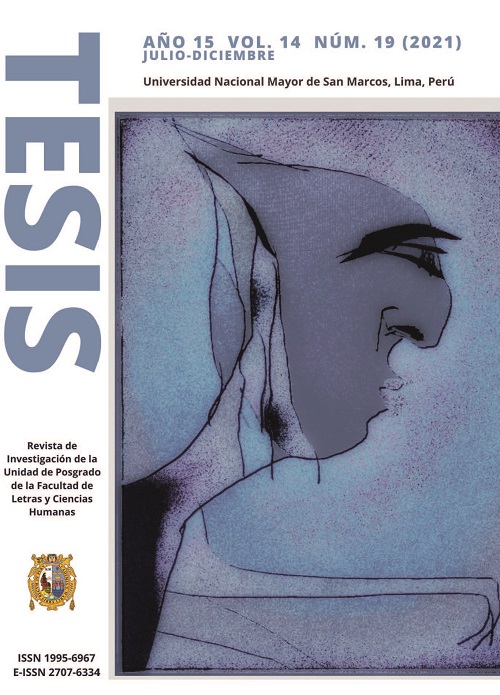Lima in three works by José María Arguedas: From "extranguera" city to cultural encirclement
DOI:
https://doi.org/10.15381/tesis.v14i19.21926Keywords:
migration, novel, poetic, tearing, transculturationAbstract
The objective of this article is to identify the presence of Lima and migration in three works by José María Arguedas, published between 1941 and 1964: Yawar Fiesta, Todas las sangres, and A Nuestro padre creator Túpac Amaru (himno-canción). Works released in a 25-year time frame that correspond to Arguedas’ greatest creative moment and also when the migration from the countryside to Lima occurred with greater intensity. I seek to demonstrate how Lima and the figure of the migrant is transformed into the poetics of Arguedas: in his first novel Yawar Fiesta (1941) the capital appears as that distant, foreign world that exists behind the mountain range, to which the community members of Lucanas they go down a path of their own making to establish themselves and shape the new ‘neighborhoods’ or departmental clubs. Later, in Todas las sangres, (1964), Lima is again an echo drawn from the objectives of the character Demetrio Rendón Willka, someone who after spending time in the capital returns to his hometown, with other customs. As the novel progresses, Lima will gain more and more prominence as the space to which Indians and lords flee before the disintegration of the world represented in fiction. And, finally, the vision of Lima and the migration represented in A nuestro padre creador Túpac Amaru (himno-canción) (1962), as a cultural siege to the city of the lords, without ceasing to perceive the melancholic feeling for the tear and transculturation.
References
Arguedas, J. M. (2011). Yawar Fiesta. Editorial Horizonte.
Arguedas, J. M. (2014). Todas las sangres. Editorial Horizonte
Arguedas, J. M. (2004). A nuestro padre creador Túpac Amaru (himno-canción). En C. M. Pinilla (Ed.), José María Arguedas ¡Kachkaniraqmi! ¡Sigo siendo! Textos esenciales (pp. 462-471). Fondo Editorial del Congreso del Perú.
Arguedas, J. M. (1966). Perú vivo. Editorial Juan Mejía Baca.
Arguedas, J. M. (2012 [1938]). Canto kechwa. En Obra antropológica (pp. 145-185). Tomo I. Editorial Horizonte.
Arguedas, J. M. (2004 [1942]). Carta a Arístides Arguedas. En C. M. Pinilla (Ed.), José María Arguedas ¡Kachkaniraqmi! ¡Sigo siendo! Textos esenciales (pp. 150-151). Fondo Editorial del Congreso del Perú.
Arguedas, J. M. (2012 [1955]). Función de los himnos. En Obra antropológica (pp. 76-79). Tomo IV. Editorial Horizonte.
Arguedas, J. M. (2012 [1958]). ¿Una novela sobre las barriadas? I. En Obra antropológica (pp. 92-95). Tomo V. Editorial Horizonte.
Arguedas, J. M. (Trad.). (2012 [1966]). Dioses y hombres de Huarochirí. Instituto de Estudios Peruanos.
Cornejo Polar, A. (1996). Una heterogeneidad no dialéctica: sujeto y discursos migrantes en el Perú moderno. Revista Iberoamericana, LXII (176-177), 837-844.
Escobar, A. (1984). Arguedas o la utopía de la lengua. Instituto de Estudios Peruanos.
Lienhard, M. (2015). ¿Ficción o realidad? El poder de Todas las sangres. En C. M. Pinilla (Ed.), Todas las sangres 50 años después (pp. 73-99). Ministerio de Cultura.
Matos Mar, J. (2011). Perú. Estado desbordado y sociedad nacional emergente. Editorial Universitaria, Centro de Investigación, Universidad Ricardo Palma.
Mellis, A. (2011). Poética de un demonio feliz. Fondo Editorial del Congreso del Perú.
Monte Alto, R. (2013). Arguedas y el problema del estilo en las reediciones de Yawar Fiesta. En C. Esparaza, M. Giusti, G. Núñez, C. M. Pinilla, G. Portocarrero, C. Rivera y E. Rizo-Patrón (Eds.), Arguedas: la dinámica de los encuentros interculturales (pp. 185-196). Tomo II. Fondo Editorial del Congreso del Perú.
Pinilla, C. (Ed.). (2011): Arguedas. Perú infinito. Ministerio de Cultura, Dirección Regional de Cultura de Cusco.
Pinilla, C. (Ed.). (2015). Todas las sangres, cincuenta años después. Ministerio de Cultura.
Reyes Tarazona, R. (2019). Lima: narrativa, sociedad y espacio. Universidad Ricardo Palma. Vicerrectorado de Investigación.
Ubilluz, J. C. (2021). Sobre el destino incierto del pueblo indio y de su pachakutiy por la vía cultual (Una lectura de “A nuestro padre creador Túpac Amaru”, de José María Arguedas. En P. De Lima (Ed.), Golpe, furia, Perú. Poesía y nación (pp. 73-92). Editorial Horizonte.
Vich, V. (2018). Poetas peruanos del siglo XX. Lecturas críticas. Fondo Editorial de la Pontificia Universidad Católica del Perú.
Downloads
Published
Issue
Section
License
Copyright (c) 2021 Jorge Paredes Laos

This work is licensed under a Creative Commons Attribution 4.0 International License.
THE AUTHORS RETAIN THEIR RIGHTS:
(a) The authors retain their trademark and patent rights, and also on any process or procedure described in the article.
(b) The authors retain the right to share, copy, distribute, execute and publicly communicate the article published in Tesis (Lima) (in example, depositing the article in an institutional repository or publish it in a book), with recognition of its initial publication in the Tesis (Lima).
(c) The authors retain the right to make a later publication of their work, to use the article or any part of it (for example: a compilation of their works, notes for conferences, thesis, or for a book), provided that they indicate the source of publication (authors of the work, magazine, volume, number and date).






